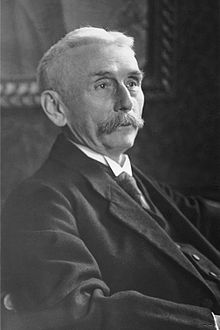Otto Schott: Difference between revisions
m Reverted edits by 197.211.57.236 (talk) to last version by Raymie Tag: Rollback |
General clean-up |
||
| Line 6: | Line 6: | ||
|caption = |
|caption = |
||
|birth_date = {{birth date|1851|12|17|df=y}} |
|birth_date = {{birth date|1851|12|17|df=y}} |
||
|birth_place = [[Witten]] |
|birth_place = [[Witten, Germany]] |
||
|death_date = {{death date and age|1935|8|27|1851|12|17|df=y}} |
|death_date = {{death date and age|1935|8|27|1851|12|17|df=y}} |
||
|death_place = [[Jena]] |
|death_place = [[Jena, Germany]] |
||
|residence = |
|residence = |
||
|nationality = [[Germany|German]] |
|nationality = [[Germany|German]] |
||
|alma_mater = [[Friedrich Schiller University |
|alma_mater = [[Friedrich Schiller University Jena]] |
||
|doctoral_advisor = |
|doctoral_advisor = |
||
|doctoral_students = |
|doctoral_students = |
||
|known_for = [[borosilicate glass]] |
|known_for = invention of [[borosilicate glass]] |
||
|footnotes = |
|footnotes = |
||
|field = |
|field = |
||
|work_institution = |
|work_institution = Friedrich Schiller University Jena |
||
|prizes = [[Liebig Medal]] (1909) |
|prizes = [[Liebig Medal]] (1909) |
||
|religion = |
|religion = |
||
}} |
|||
'''Friedrich Otto Schott''' (17 December 1851 – 27 August 1935) was a [[German people|German]] [[chemist]], glass technologist, and the inventor of [[borosilicate glass]]. He was the son of a window glass maker, Simon Schott. From 1870 to 1873 Schott studied chemical technology at the technical college in [[Aachen]] and at the universities of [[University of Würzburg|Würzburg]] and [[University of Leipzig|Leipzig]]. He attained a doctorate in glass chemistry at [[Friedrich Schiller University of Jena]] for his thesis “Contributions to the Theory and Practice of Glass Fabrication”.<ref>Schott, Otto. [http://www.schott.com/english/news/press.html?NID=1190 “Contributions to the Theory and Practice of Glass Fabrication”]</ref> |
|||
In 1879, Schott developed a new [[lithium]]-based glass that possessed novel [[optics|optical]] properties. Schott shared this discovery with [[Ernst Karl Abbe|Dr Ernst Abbe]], which was the catalyst for a long professional relationship between the two. |
In 1879, Schott developed a new [[lithium]]-based glass that possessed novel [[optics|optical]] properties. Schott shared this discovery with [[Ernst Karl Abbe|Dr Ernst Abbe]], which was the catalyst for a long professional relationship between the two scientists. |
||
In 1884, in association with Dr [[Ernst Abbe]] and [[Carl Zeiss]], Otto founded ''[[Glastechnische Laboratorium Schott & Genossen]]'' (Schott & Associates Glass Technology Laboratory) in Jena. It was here, during the period 1887 through to 1893, that Schott developed borosilicate glass. Borosilicate glass is distinguished for its high tolerance to heat and a substantial resistance to thermal shock (sudden temperature changes) and resistance to degradation when exposed to chemicals. |
In 1884, in association with Dr [[Ernst Abbe]] and [[Carl Zeiss]], Otto founded ''[[Glastechnische Laboratorium Schott & Genossen]]'' (Schott & Associates Glass Technology Laboratory) in Jena. It was here, during the period 1887 through to 1893, that Schott developed borosilicate glass. Borosilicate glass is distinguished for its high tolerance to heat and a substantial resistance to thermal shock (sudden temperature changes) and resistance to degradation when exposed to chemicals. |
||
| Line 28: | Line 29: | ||
In 1926, Otto Schott retired from active work at Schott & Gen. |
In 1926, Otto Schott retired from active work at Schott & Gen. |
||
== |
==See also== |
||
*[[Calculation of glass properties]] |
*[[Calculation of glass properties]] |
||
Revision as of 21:50, 7 December 2020
Otto Schott | |
|---|---|
 | |
| Born | 17 December 1851 |
| Died | 27 August 1935 (aged 83) |
| Nationality | German |
| Alma mater | Friedrich Schiller University Jena |
| Known for | invention of borosilicate glass |
| Awards | Liebig Medal (1909) |
| Scientific career | |
| Institutions | Friedrich Schiller University Jena |
Friedrich Otto Schott (17 December 1851 – 27 August 1935) was a German chemist, glass technologist, and the inventor of borosilicate glass. He was the son of a window glass maker, Simon Schott. From 1870 to 1873 Schott studied chemical technology at the technical college in Aachen and at the universities of Würzburg and Leipzig. He attained a doctorate in glass chemistry at Friedrich Schiller University of Jena for his thesis “Contributions to the Theory and Practice of Glass Fabrication”.[1]
In 1879, Schott developed a new lithium-based glass that possessed novel optical properties. Schott shared this discovery with Dr Ernst Abbe, which was the catalyst for a long professional relationship between the two scientists.
In 1884, in association with Dr Ernst Abbe and Carl Zeiss, Otto founded Glastechnische Laboratorium Schott & Genossen (Schott & Associates Glass Technology Laboratory) in Jena. It was here, during the period 1887 through to 1893, that Schott developed borosilicate glass. Borosilicate glass is distinguished for its high tolerance to heat and a substantial resistance to thermal shock (sudden temperature changes) and resistance to degradation when exposed to chemicals.
In 1926, Otto Schott retired from active work at Schott & Gen.
See also
Notes
External links
